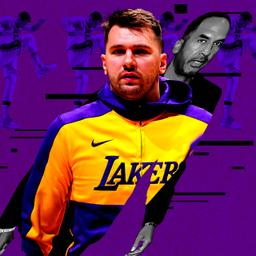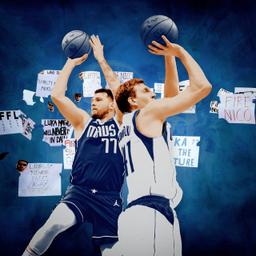Luka Doncic spent the two-minute, 20-second tribute to his Mavericks career hunched over on the visiting bench, trying—and failing—to fight back tears. Memory after memory flashed by on the screen above. Huge plays. Big laughs. Pure joy. Before long, the swelling music was drowned out by the crowd in Dallas chanting Luka’s name, welcoming him home. It was a truly powerful moment that never should have happened.
The Mavericks’ decision to move on from Doncic somehow makes even less sense today than it did two months ago, when it shocked both Luka and the broader basketball world. It’s already one of the most incomprehensible trades in the history of professional sports. “Some have compared it to Babe Ruth, which is kind of cool,” Mavericks coach Jason Kidd said before Wednesday night’s game. Yet unless you’re the Yankees, it really, really isn’t. If you want to make history, you’d better be absolutely sure you’re on the right side of it. And the Mavericks chose to bet against a transcendent 26-year-old superstar who—among his many achievements—took them to the NBA Finals just last season. The Mavs have seemed cursed ever since, but mostly they invited this. Injury after injury, frustration after frustration. What was a contender now finds itself spiraling toward the 10-seed.
The Lakers’ first trip to Dallas took on unprecedented significance the moment the trade was made. The NBA has seen its share of rematches and returns, but never anything like Wednesday night. Luka didn’t demand a trade. He didn’t bolt in free agency or even suggest that he might. It was Mavs general manager Nico Harrison who put Luka in purple and gold—and when Doncic made his return to the American Airlines Center, a jarring portion of the crowd dressed accordingly. Some even paired their no. 77 Lakers jerseys with cowboy hats. Once the game began, the crowd stood until Luka scored his first points: a floater in the lane for a quick two, on his way to a cathartic 45 points (to say nothing of his eight rebounds, six assists, and four steals) on the night.
"I don't know how I did it,” Doncic told ESPN’s Lisa Salters after the final buzzer. “Because when I was watching the video, I was like: There is no way I'm playing this game.”
The crowd cheered every one of Luka’s touches and every one of his baskets—celebrating, in effect, a 112-97 Dallas loss. The Mavs played a road game in their own arena, as they probably will again the next time Doncic and the Lakers come to town. And the next. And the next. Trading away Luka was a terrible basketball decision and a costly business decision. But moreover, it was a woeful misunderstanding of why people care about sports in the first place. This might seem like a quaint idea in 2025, but an NBA team really is a public trust. It might be owned by a billionaire and run by a billionaire’s son-in-law, but it doesn’t really belong to them. It can’t. Players give a team life, and the bonds that fans forge with those players give it meaning. Wednesday night was a stark reminder of that.
For seven years, Mavs fans were told that Doncic was the future. And in those seven years, they were shown enough to believe it: the passing genius, the crunch-time brilliance. It was undeniable. The individual accolades, the team success—all of it validation for those who had lived and died with every stepback 3 along the way. And then, one night, it was all gone.
Players like Luka Doncic don’t get traded. They’re too important, in every sense, and the risks of trading away a superstar as young and as dominant as Luka are far too great. The costs of swapping a rising talent for an older star have already been borne out: The window for this new Mavericks team was quite short to begin with, and after Kyrie Irving’s ACL tear, it may be nonexistent. All the hope for what Luka could bring has evaporated. All that investment, betrayed. Trading Luka was the kind of decision that will set the Mavs back in more ways than their leadership seems ready to understand.
Beyond the adulation of Doncic, there was one other refrain that rang out from the American Airlines Center crowd on Wednesday night: “FI-RE NI-CO. FI-RE NI-CO. FI-RE NI-CO.” The chants only grew louder as the game wore on. Harrison was in attendance for those calls, watching stone-faced from the tunnel as Doncic put on a show and Anthony Davis—the centerpiece of Dallas’s trade return—scored just 13 points. In the fourth quarter, Mavs fans unfurled hidden signs with the same message, smuggled past arena security. One fan, during a jumbotron-led sing-along of “All the Small Things,” held up a shirt that read “NICO SUCKS” before the camera quickly cut away.
Trading away a player as beloved as Luka was never going to be popular in Dallas. Yet those chants—and the outright contempt for Mavericks management—draw on more layered frustrations. Harrison’s public attempts to explain the trade not only rang false, but also took implied shots at Doncic’s work ethic and defense. Team governor Patrick Dumont circled back for more of the same, bumbling through an assertion that all-time legends like Jordan, Kobe, and—amazingly—Shaq “worked really hard, every day, with a singular focus to win.” Sourced reports from team officials questioned Luka’s commitment, professionalism, and alcohol consumption.
Does a franchise that trades a player away and then makes it personal still get to screen print a sentimental T-shirt for his return? If they remove all evidence of him from displays representing team history, do they still get to thank him in a tribute?
This all feels confused and conflicted because the Mavericks are both. An NBA organization is not a monolith; the trade caught so many people who work for the team by surprise and left rank-and-file employees as frustrated as the fan base. They had invested in Luka, too. Maybe the tribute video—which featured some of those staffers thanking Doncic—was as much for them as it was for Luka. So many people connected to this trade are still looking for closure. They may never find it. “Talking about closure, it’s sometimes hard because I spent a lot of time here,” Doncic said.
Eventually, it should at least start to feel more normal to see him in a Laker uniform, lighting up the Mavs the way he’s lit up every other team. Luka himself will at some point get used to walking into the smaller visiting locker room in Dallas rather than the space station he’s used to. Someday all this might feel more familiar, if not exactly resolved.
Yet for Wednesday night, it was neither. Luka was sensational, particularly given these unusual circumstances. The stepbacks were falling, and the no-look passes were flying. There is a magnetism to Doncic’s game that Dallas knows all too well. It pulls a team into rhythm. It brings role players along for the ride. And most importantly, it wins games. Many of the fans in attendance just stood and waited after the final buzzer, as if they weren’t quite sure what to do with themselves. They lingered until Luka finished up his walk-off interview—to give one more rousing ovation to the star their team traded away. And as they packed up their things and streamed to the exits, an ad on the jumbotron encouraged them to return on Friday for Fan Appreciation Night.



